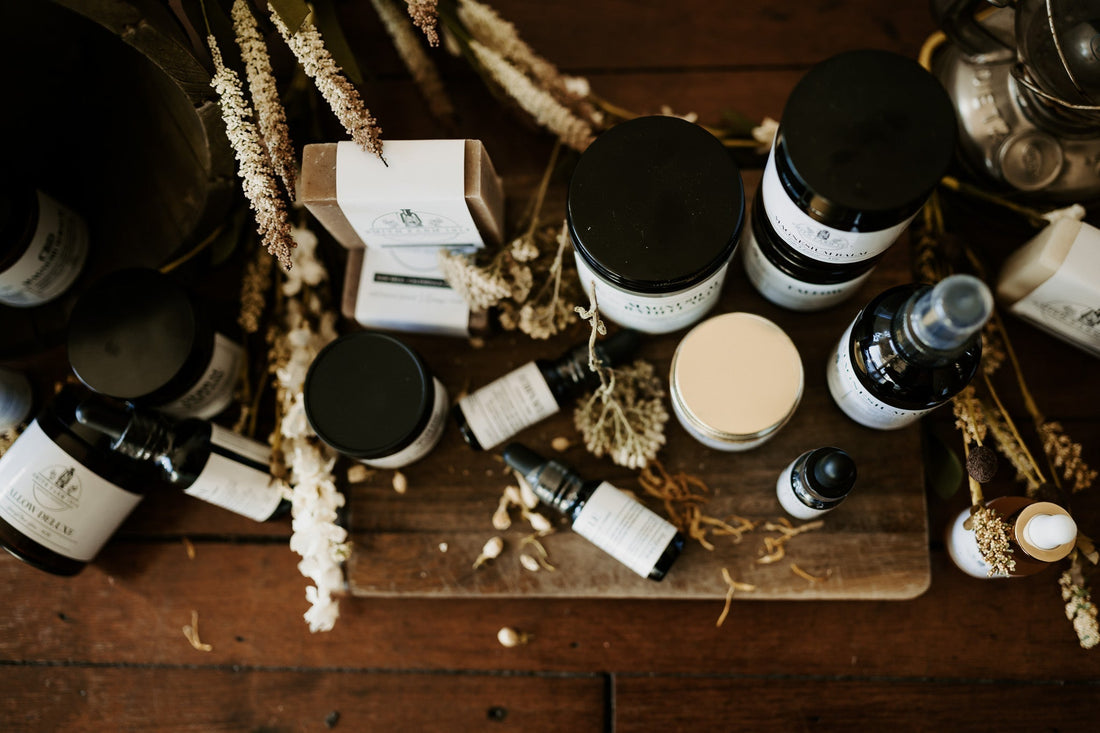
Is Your Skincare Causing More Harm Than Good?
Share
When it comes to skincare, most people want simple things: clear, healthy, glowing skin. We’re taught from an early age to cleanse, tone, moisturize—and trust the labels that promise radiant results. Follow the 10 step night routine for clear skin.. But what if the very products you’ve been taught to rely on are doing more harm than good?
In the pursuit of beauty and wellness, the modern skincare industry has exploded with options. Shelves are lined with serums, masks, lotions, and potions claiming to reverse aging, hydrate dry skin, and banish breakouts. But underneath the pretty packaging and greenwashed words, many products are packed with ingredients that can be harsh, irritating, and even harmful—especially in the long term.

The Hidden Harm in Conventional Skincare
Some common words that should be on your radar.
Fragrance
One of the biggest culprits in problematic skincare is synthetic fragrance. “Fragrance” on an ingredient list can be a catch-all term for hundreds of undisclosed chemicals, many of which are known to cause skin irritation, allergic reactions, and even disrupt hormones. If you’ve ever used a lotion that smelled amazing but left your skin red or itchy, you’ve likely experienced this firsthand.
Parabens
Parabens, another common additive, are used as preservatives to extend shelf life. But these chemicals mimic estrogen in the body, raising concerns about hormone disruption. Studies have found parabens in breast tissue, and while the research is ongoing, many health-conscious consumers are choosing to err on the side of caution. Here are some common parabens and what they do and how they can affect our bodies.
1. Methylparaben
-
May mimic estrogen (linked to hormone disruption)
-
Can cause skin irritation or allergic reactions
-
Found in breast tumor tissues (not proven to cause cancer but raises concerns)
2. Ethylparaben
-
May act as an endocrine disruptor (interferes with hormones)
-
Can trigger allergic skin reactions in sensitive individuals
3. Propylparaben
-
Stronger estrogen-mimicking activity than methylparaben
-
Linked to reduced sperm count in animal studies
-
May cause reproductive system disruption
4. Butylparaben
-
Considered one of the most estrogenic parabens
-
Potential fertility impacts and hormone disruption
-
Known to be a skin allergen for some
5. Isobutylparaben
-
Limited human studies, but shown to interfere with hormone function in animals
-
Often grouped with butylparaben in regulatory concerns
Sulfates
Sulfates, such as sodium laurel sulfate (SLS) are commonly used to create that wonderful lather in shampoo and cleansers and body washes. While they are effective at lifting dirt and oil, they can also be incredibly harsh--stripping the skin and scalp of their natural protective oils. This can lead to dryness, irritation and increased sensitivity especially for people with eczema, rosacea or compromised skin. Beyond the surface some forms of sulfate me be contaminated with 1, 4 dioxane,, and potential carcinogen, during the manufacturing process.
But My Skin Looks Fine…
You might be thinking, “But I’ve used these products for years and my skin’s okay.” The thing is, some of the damage isn’t immediate. It shows up slowly—dry patches that won’t go away, increased sensitivity, adult acne, or skin that feels out of balance despite your best efforts.
The damage caused by many conventional skincare ingredients doesn’t always show up right away or even on the surface. While your skin might look “fine” on the outside, ingredients like parabens, synthetic fragrances, and chemical preservatives can quietly interfere with your body’s hormonal balance over time. These chemicals often mimic estrogen, throwing off your natural endocrine function, which can affect everything from mood to fertility to metabolism. You may not immediately connect your fatigue, irregular cycles, or persistent skin issues to your skincare—but your body feels it. True wellness means looking beyond what we can see and considering how products impact us at a deeper level, inside and out.
"These chemicals often mimic estrogen, throwing off your natural endocrine function, which can affect everything from mood to fertility to metabolism."

Nature Knows Best: A Return to Simplicity
At Smith Farm 1914, we believe skincare should be simple, effective, and in harmony with nature. When you feed your skin with clean, nourishing ingredients—like grass-fed tallow, calendula-infused oils, and essential oils instead of synthetic fragrance—you’re supporting its natural ability to heal, protect, and thrive.
Herbal skincare offers a gentler approach. Ingredients like chamomile, lavender, and comfrey have been used for centuries to soothe and restore skin. Rather than masking symptoms, these herbs work with your skin’s natural microbiome to bring it back into balance.
"Skincare should be simple, effective, and in harmony with nature."
Ready to Make the Switch
When I found out how horrible these chemicals were, I literally grabbed a trash bag and threw everything away but the kitchen sink in-- I'm not even kidding. But I don't recommend that as it can be costly. Start slow. Replace one product at a time. Begin with your moisturizer or cleanser—two products that stay on your skin the most. Notice how your skin responds to the change. You might be surprised by how quickly it softens, calms down, and glows. Not only that, as a personal testimony, my debilitating anxiety I've struggled with almost all my life nearly diminished.
At Smith Farm 1914, every product is made with intention. We only use ingredients that we’d feel good putting on our own families. Because skincare isn’t just about what you see in the mirror—it’s about long-term wellness, honoring your body, and reconnecting with the healing power of plants.
Your skin will thank you for it.
